Unit 3 Family life More practice and study skills课件(17张ppt)
文档属性
| 名称 | Unit 3 Family life More practice and study skills课件(17张ppt) | 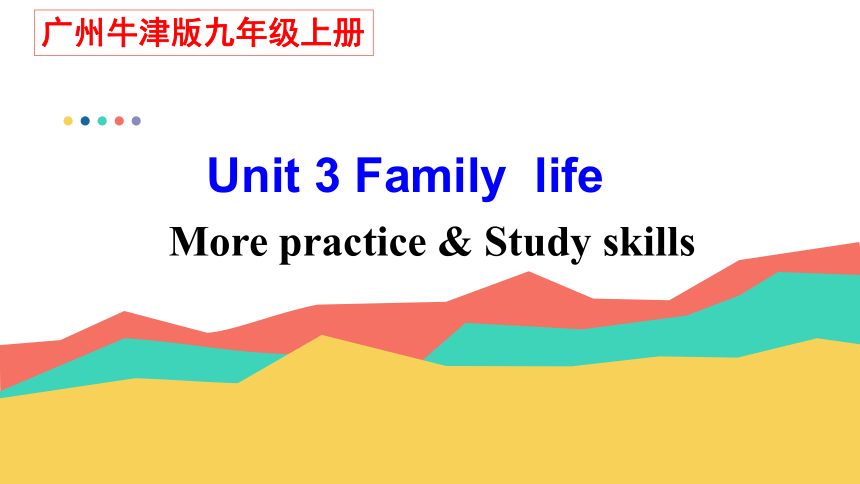 | |
| 格式 | pptx | ||
| 文件大小 | 1.4MB | ||
| 资源类型 | 教案 | ||
| 版本资源 | 牛津深圳版 | ||
| 科目 | 英语 | ||
| 更新时间 | 2021-09-17 15:54:26 | ||
图片预览

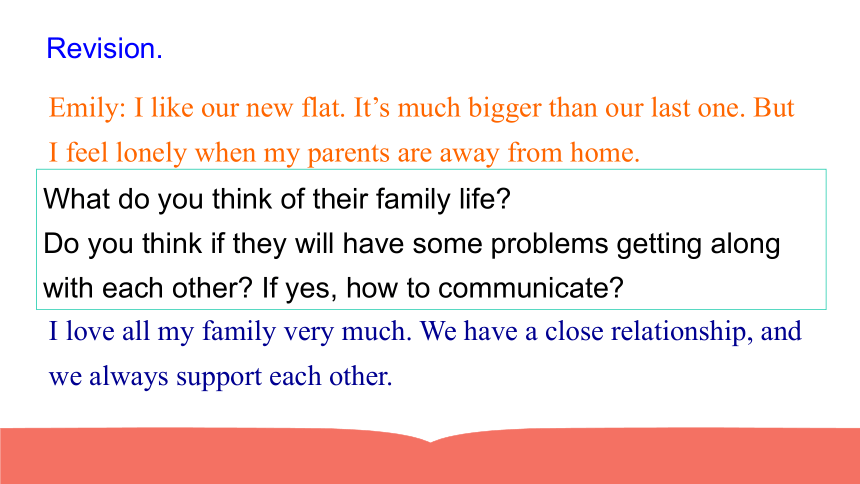
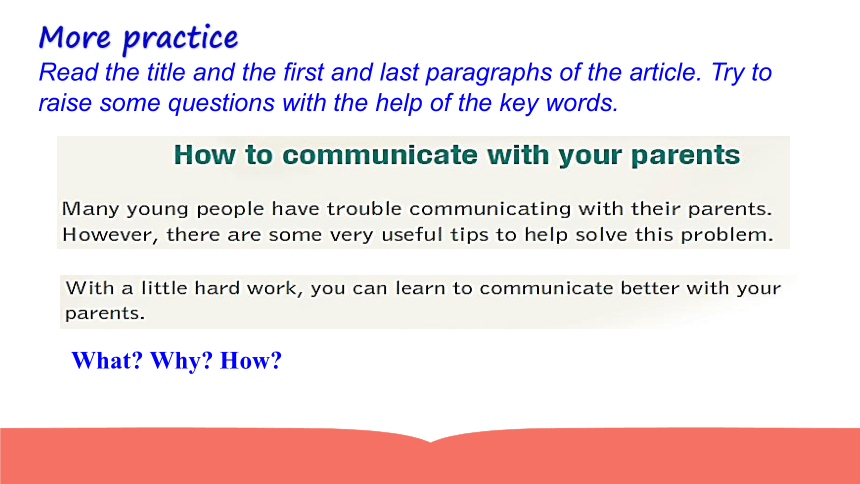
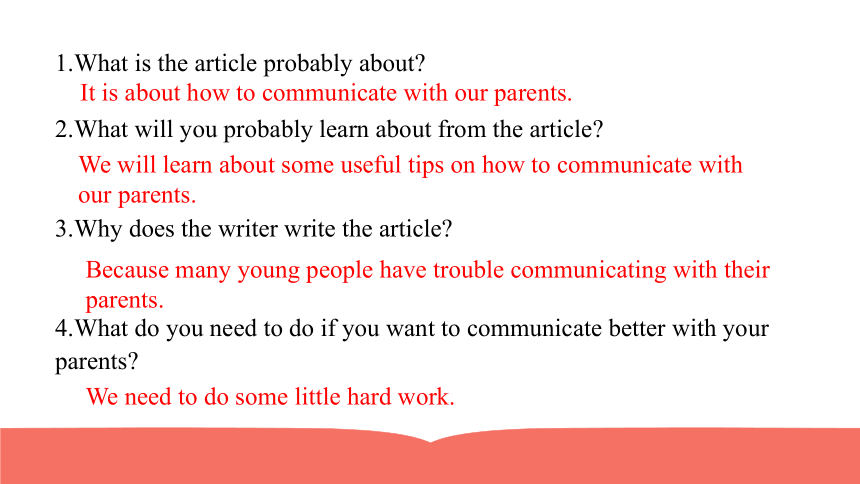
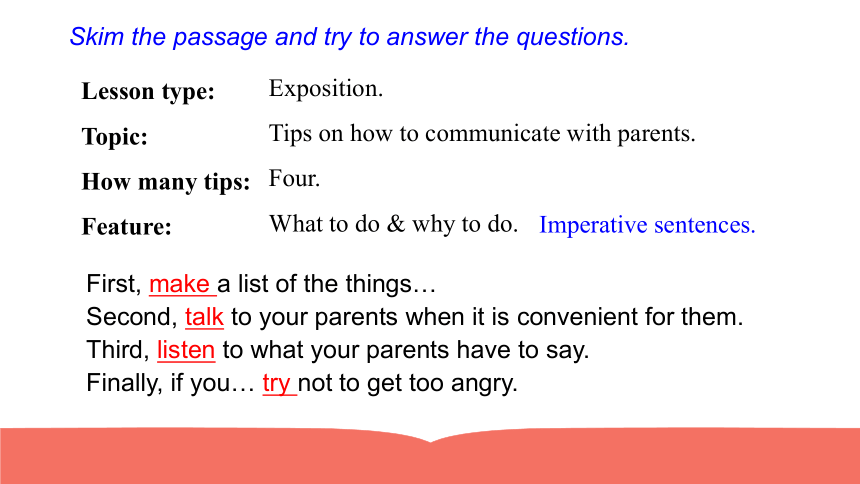
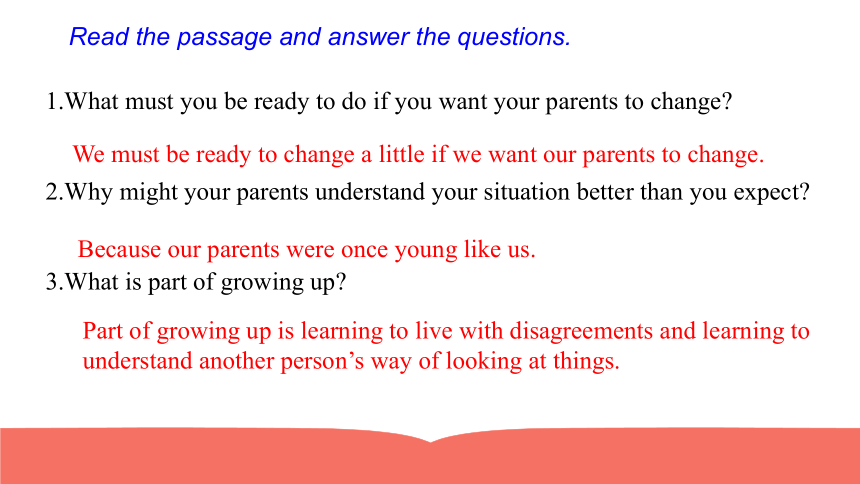
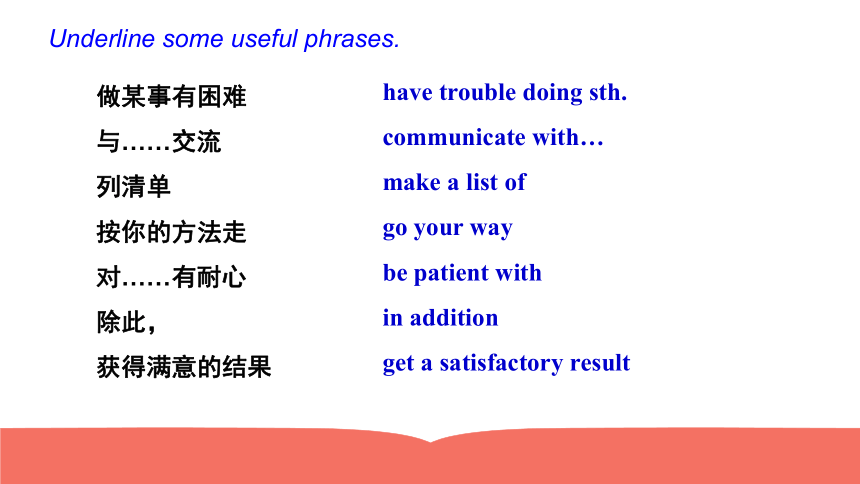
文档简介
(共17张PPT)
广州牛津版九年级上册
Unit
3
Family
life
More
practice
&
Study
skills
Revision.
Emily:
I
like
our
new
flat.
It’s
much
bigger
than
our
last
one.
But
I
feel
lonely
when
my
parents
are
away
from
home.
Jerry:
Although
it
sometimes
feels
crowded
in
our
little
flat,
we
don’t
mind.
I
love
all
my
family
very
much.
We
have
a
close
relationship,
and
we
always
support
each
other.
What
do
you
think
of
their
family
life?
Do
you
think
if
they
will
have
some
problems
getting
along
with
each
other?
If
yes,
how
to
communicate?
Read
the
title
and
the
first
and
last
paragraphs
of
the
article.
Try
to
raise
some
questions
with
the
help
of
the
key
words.
What?
Why?
How?
More
practice
1.What
is
the
article
probably
about?
2.What
will
you
probably
learn
about
from
the
article?
3.Why
does
the
writer
write
the
article?
4.What
do
you
need
to
do
if
you
want
to
communicate
better
with
your
parents?
It
is
about
how
to
communicate
with
our
parents.
We
will
learn
about
some
useful
tips
on
how
to
communicate
with
our
parents.
Because
many
young
people
have
trouble
communicating
with
their
parents.
We
need
to
do
some
little
hard
work.
Lesson
type:
Topic:
How
many
tips:
Feature:
Skim
the
passage
and
try
to
answer
the
questions.
Exposition.
Tips
on
how
to
communicate
with
parents.
Four.
What
to
do
&
why
to
do.
First,
make
a
list
of
the
things…
Second,
talk
to
your
parents
when
it
is
convenient
for
them.
Third,
listen
to
what
your
parents
have
to
say.
Finally,
if
you…
try
not
to
get
too
angry.
Imperative
sentences.
1.What
must
you
be
ready
to
do
if
you
want
your
parents
to
change?
2.Why
might
your
parents
understand
your
situation
better
than
you
expect?
3.What
is
part
of
growing
up?
We
must
be
ready
to
change
a
little
if
we
want
our
parents
to
change.
Because
our
parents
were
once
young
like
us.
Part
of
growing
up
is
learning
to
live
with
disagreements
and
learning
to
understand
another
person’s
way
of
looking
at
things.
Read
the
passage
and
answer
the
questions.
做某事有困难
与……交流
列清单
按你的方法走
对……有耐心
除此,
获得满意的结果
have
trouble
doing
sth.
communicate
with…
make
a
list
of
go
your
way
be
patient
with
in
addition
get
a
satisfactory
result
Underline
some
useful
phrases.
Discussion
What
kinds
of
problems
do
you
have
with
your
parents?
How
do
you
solve
them?
Do
you
have
any
other
tips?
Discuss
these
with
your
classmates.
Sometimes
setting
rules
is
also
a
good
idea.
Do
your
parents
make
rules
for
you
at
home?
Give
some
examples.
Where
else
do
we
have
rules
and
regulations?
Discuss
and
answer
the
questions
below.
Study
skills
Making
rules
and
regulations
We
have
rules
and
regulations
everywhere,
e.g.
at
home,
at
school,
in
the
library
and
at
the
underground
station.
We
can
express
the
rules
as
dos
(positive
rules)
and
don’ts
(negative
rules).
For
example:
Jerry’s
parents
have
set
some
rules
for
him.
Read
what
Jerry’s
mother
says
and
complete
the
rules.
A
Come
back
home
by
5
p.m.
Don’t
watch
TV
when
you’re
eating
dinner.
Help
wash
the
dishes
after
dinner.
Finish
your
homework
and
then
go
to
bed
before
nine.
Don’t
play
computer
games
for
more
than
30
minutes
at
a
time
at
the
weekend.
We
can
also
express
the
rules
by
using
No
+
a
gerund.
For
example:
Read
Mr
Li’s
words
and
complete
the
rules.
B
No
smoking.
No
cycling.
No
playing
in
the
fountains.
No
sleeping
on
the
benches.
No
begging.
Work
in
groups
to
make
five
rules
on
one
of
the
following
topics.
For
the
family—to
make
family
life
more
pleasant
For
using
public
transport—to
make
travelling
safer
For
the
environment—to
make
the
Earth
a
better
place
C
Homework.
Review
what
we
have
learnt
in
this
unit.
Finish
the
relevant
exercise
in
Student
Times.
THANKS
广州牛津版九年级上册
Unit
3
Family
life
More
practice
&
Study
skills
Revision.
Emily:
I
like
our
new
flat.
It’s
much
bigger
than
our
last
one.
But
I
feel
lonely
when
my
parents
are
away
from
home.
Jerry:
Although
it
sometimes
feels
crowded
in
our
little
flat,
we
don’t
mind.
I
love
all
my
family
very
much.
We
have
a
close
relationship,
and
we
always
support
each
other.
What
do
you
think
of
their
family
life?
Do
you
think
if
they
will
have
some
problems
getting
along
with
each
other?
If
yes,
how
to
communicate?
Read
the
title
and
the
first
and
last
paragraphs
of
the
article.
Try
to
raise
some
questions
with
the
help
of
the
key
words.
What?
Why?
How?
More
practice
1.What
is
the
article
probably
about?
2.What
will
you
probably
learn
about
from
the
article?
3.Why
does
the
writer
write
the
article?
4.What
do
you
need
to
do
if
you
want
to
communicate
better
with
your
parents?
It
is
about
how
to
communicate
with
our
parents.
We
will
learn
about
some
useful
tips
on
how
to
communicate
with
our
parents.
Because
many
young
people
have
trouble
communicating
with
their
parents.
We
need
to
do
some
little
hard
work.
Lesson
type:
Topic:
How
many
tips:
Feature:
Skim
the
passage
and
try
to
answer
the
questions.
Exposition.
Tips
on
how
to
communicate
with
parents.
Four.
What
to
do
&
why
to
do.
First,
make
a
list
of
the
things…
Second,
talk
to
your
parents
when
it
is
convenient
for
them.
Third,
listen
to
what
your
parents
have
to
say.
Finally,
if
you…
try
not
to
get
too
angry.
Imperative
sentences.
1.What
must
you
be
ready
to
do
if
you
want
your
parents
to
change?
2.Why
might
your
parents
understand
your
situation
better
than
you
expect?
3.What
is
part
of
growing
up?
We
must
be
ready
to
change
a
little
if
we
want
our
parents
to
change.
Because
our
parents
were
once
young
like
us.
Part
of
growing
up
is
learning
to
live
with
disagreements
and
learning
to
understand
another
person’s
way
of
looking
at
things.
Read
the
passage
and
answer
the
questions.
做某事有困难
与……交流
列清单
按你的方法走
对……有耐心
除此,
获得满意的结果
have
trouble
doing
sth.
communicate
with…
make
a
list
of
go
your
way
be
patient
with
in
addition
get
a
satisfactory
result
Underline
some
useful
phrases.
Discussion
What
kinds
of
problems
do
you
have
with
your
parents?
How
do
you
solve
them?
Do
you
have
any
other
tips?
Discuss
these
with
your
classmates.
Sometimes
setting
rules
is
also
a
good
idea.
Do
your
parents
make
rules
for
you
at
home?
Give
some
examples.
Where
else
do
we
have
rules
and
regulations?
Discuss
and
answer
the
questions
below.
Study
skills
Making
rules
and
regulations
We
have
rules
and
regulations
everywhere,
e.g.
at
home,
at
school,
in
the
library
and
at
the
underground
station.
We
can
express
the
rules
as
dos
(positive
rules)
and
don’ts
(negative
rules).
For
example:
Jerry’s
parents
have
set
some
rules
for
him.
Read
what
Jerry’s
mother
says
and
complete
the
rules.
A
Come
back
home
by
5
p.m.
Don’t
watch
TV
when
you’re
eating
dinner.
Help
wash
the
dishes
after
dinner.
Finish
your
homework
and
then
go
to
bed
before
nine.
Don’t
play
computer
games
for
more
than
30
minutes
at
a
time
at
the
weekend.
We
can
also
express
the
rules
by
using
No
+
a
gerund.
For
example:
Read
Mr
Li’s
words
and
complete
the
rules.
B
No
smoking.
No
cycling.
No
playing
in
the
fountains.
No
sleeping
on
the
benches.
No
begging.
Work
in
groups
to
make
five
rules
on
one
of
the
following
topics.
For
the
family—to
make
family
life
more
pleasant
For
using
public
transport—to
make
travelling
safer
For
the
environment—to
make
the
Earth
a
better
place
C
Homework.
Review
what
we
have
learnt
in
this
unit.
Finish
the
relevant
exercise
in
Student
Times.
THANKS
